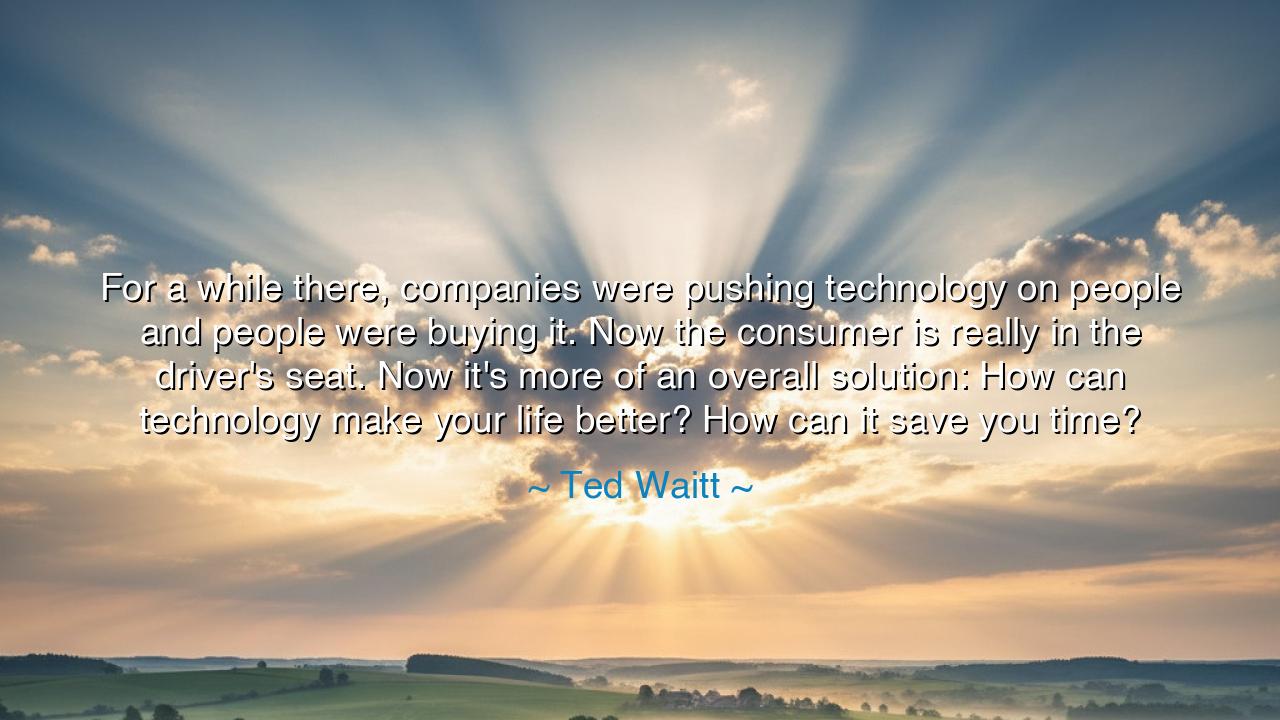
For a while there, companies were pushing technology on people
For a while there, companies were pushing technology on people and people were buying it. Now the consumer is really in the driver's seat. Now it's more of an overall solution: How can technology make your life better? How can it save you time?






Ted Waitt, visionary of the digital age, once spoke these words with clarity and foresight: “For a while there, companies were pushing technology on people and people were buying it. Now the consumer is really in the driver’s seat. Now it’s more of an overall solution: How can technology make your life better? How can it save you time?” In this statement lies the shift of power, from the hands of corporations to the will of the people, from blind consumption to purposeful demand. He reveals the awakening of humankind, the realization that technology is not to be idolized for its own sake, but to be measured by its service to life itself.
In the beginning, as the age of computers and devices dawned, companies hurled forth inventions with dazzling speed. People bought them not because they were necessary, but because they were new. To own a machine was to feel powerful, to stand at the edge of the future. Yet, as Waitt reminds us, this was a season of imbalance, when technology dictated life rather than serving it. The crowd followed the glitter of novelty, but the heart was not satisfied, for mere possession does not equal progress.
But then came the turning. The consumer, once dazzled, began to awaken. They began to ask deeper questions: What is the purpose of this device? Does it make my life richer, fuller, more meaningful? Does it give me more time, the most precious currency of all? Thus the balance of power shifted. Companies no longer could merely flood the world with objects; they had to listen, to craft solutions that aligned with the needs of people. The marketplace itself became a dialogue, a dance between invention and human longing.
History offers parallels to this transformation. In the days of the Industrial Revolution, factories produced goods at a pace never before seen. At first, people consumed without thought, drawn by abundance and novelty. Yet in time, they demanded not only quantity but quality — safer products, fairer labor, goods that improved daily life rather than burdened it. The same pattern unfolds in the realm of technology: the first rush is wonder, but the lasting value is measured in how it uplifts the human condition.
This shift also carries a warning. For though the consumer is in the driver’s seat, choice is itself a heavy burden. The temptation remains to chase novelty, to drown in distraction, to mistake endless devices for genuine progress. The wise must learn discernment, to ask as Waitt asks: Does this make me better? Does it grant me more freedom, more clarity, more time for what truly matters? If not, then the tool is no tool, but a chain.
The meaning of Waitt’s words is this: true technology serves life, not the other way around. Its measure is not in complexity or price, but in simplicity, in how it restores to us the hours we would otherwise lose. A tool is holy when it gives us time for family, for creation, for rest, for wonder. A tool is hollow when it consumes us, steals our attention, and leaves us emptier than before.
Therefore, let the listener act with wisdom. Do not be a slave to every invention. Before embracing new technology, ask: Will this make my days lighter? Will it deepen my joy? Will it give me time to love, to create, to live more fully? Choose only those tools that serve the higher good, and cast away those that demand worship. For as Ted Waitt has taught, we are no longer passengers on the road of progress. We sit at the helm, and the question is not how fast we can go, but whether our tools will lead us toward a richer, more human life.






AAdministratorAdministrator
Welcome, honored guests. Please leave a comment, we will respond soon